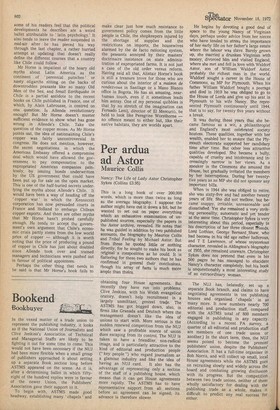Bookend
Bookbuyer
In the vexed matter of a trade union to represent the publishing industry, it looks as if the National Union of Journalists and Clive Jenkins's Association of Technical and Managerial Staffs are likely to be fighting it out for some time to come. This would not have been necessary if the NUJ had been more flexible when a small group of publishers approached it about setting up a separate Book section long before ASTMS appeared on the scene. As it is, after a determining ballot in which fiftyeight of the hundred replies were in favour of the newer Union, the Publishers' Association gave their support to it.
To begin with, ASTMS made good headway, establishing many ' chapels ' and obtaining four House agreements. But recently they have run into problems. Clive Jenkins, with his Welsh evangelical oratory, doesn't help recruitment in a largely unmilitant, genteel trade. The ASTMS has got bogged down, also, in firms like Granada and Deutsch where the management doesn't like the idea of unions to start with. More serious is the sudden renewed competition from the NUJ which saw a profitable source of union dues escaping from its control. The NUJ is taken to have a friendlier, non-radical image, and is particularly attractive to the kind of editorial and production people (" key people ") who regard journalism as a glamour industry and like the idea of having an NUJ card. It also has the advantage of representing only a section of the staff of a publishing house, which means that it can get House agreements more rapidly. The ASTMS has to have representative support from all sections before an agreement can be signed; its advance is therefore slower. The NUJ has, belatedly, set up a separate Book branch, and claims to have negotiated agreements in ten publishing houses and organised ' chapels ' in as many more. It .now numbers nearly 700 editorial and production staff, compared with the ASTMS total of 800 members engaged in publishing in any capacity. (According to a recent PA survey, a quarter of all editorial and production staff are members of one trade union or another.) In the short term, then, the NUJ seems poised to become the premier publishers' union, despite the Publishers' Association. It has a full-time organiser in Bob Norris, and will collect up small, local House agreements while the ASTMS goes on recruiting slowly and widely across the board, and combating growing disillusion with its progress. But the competition between two trade unions, neither of them wholly satisfactory for dealing with the publishing trade as a whole, makes It difficult to predict any real success for either.


















































 Previous page
Previous page